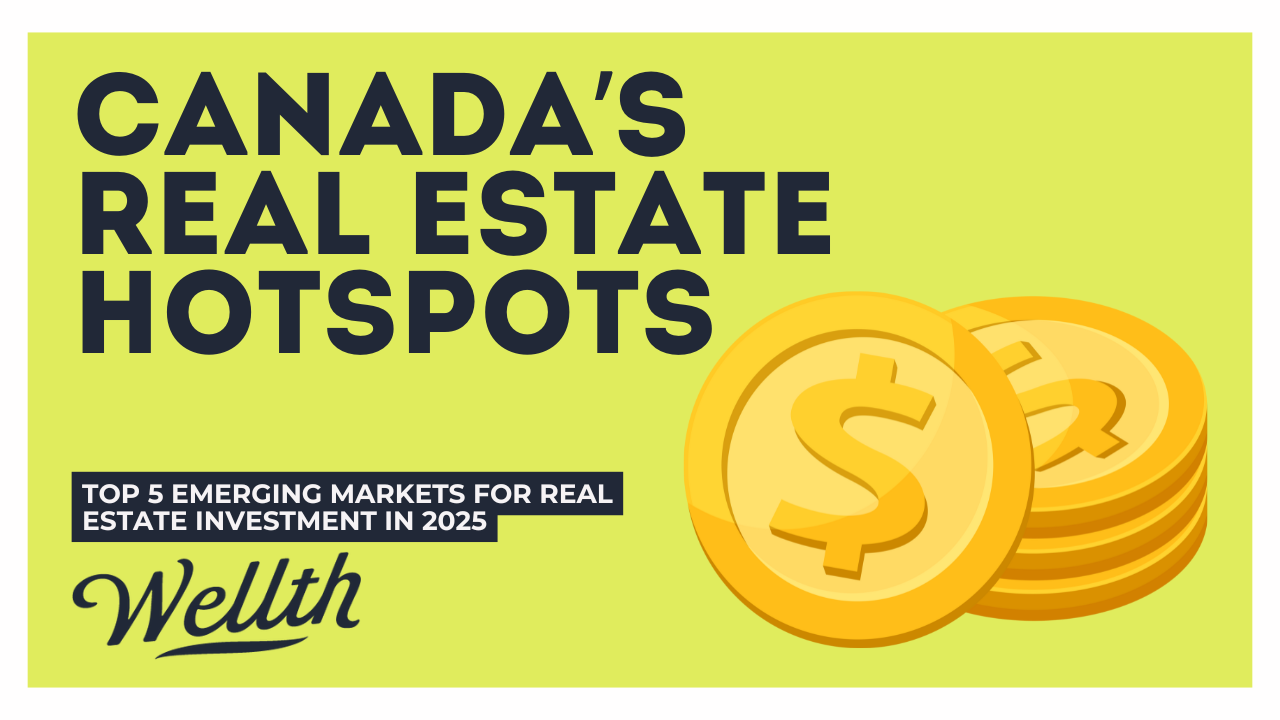Canada’s Hotspots: Top 5 Emerging Markets for Real Estate Investment in 2025
Don’t Miss Out—These Canadian Cities Are Set to Explode in Value!
As the Canadian real estate market evolves, savvy investors are constantly on the hunt for emerging opportunities that promise exceptional growth potential. While major cities like Toronto and Vancouver have long been the stalwarts of property appreciation, skyrocketing prices and tightening rental yields have forced investors to look elsewhere. As we dive into 2025, let's explore five under-the-radar Canadian hotspots poised for impressive returns, combining robust economic fundamentals, growing populations, and attractive affordability.
1. Halifax, Nova Scotia: Riding the Wave of Maritime Growth
Halifax is quickly becoming one of Canada’s hottest real estate markets. With affordable housing, steady economic growth, and increasing immigration, Halifax is a magnet for investors seeking strong rental demand and capital appreciation. The city's growing tech industry, bolstered by startups and established companies, is attracting young professionals in droves, significantly boosting rental demand.
Moreover, Halifax’s housing market remains notably affordable compared to national averages, allowing investors to generate solid returns with less upfront capital.
Average home price (2025): Approx. $550,000
Annual price growth projection: 9%
Click here to see Halifax’s latest real estate trends.
2. Kelowna, British Columbia: The Next Big West Coast Play
Move over Vancouver—Kelowna is poised to become British Columbia’s next major real estate powerhouse. Renowned for its stunning vineyards, lakeside lifestyle, and thriving tourism industry, Kelowna is increasingly attractive to remote workers and retirees seeking a blend of nature and urban convenience.
Kelowna’s appeal lies in its balanced lifestyle and booming economic fundamentals, including significant investments in infrastructure, healthcare, and higher education. Investors can expect rising property values driven by steady migration and limited housing supply.
Average home price (2025): Approx. $825,000
Annual price growth projection: 7.5%
Explore Kelowna’s booming real estate market.
3. London, Ontario: A Southern Ontario Star on the Rise
Located strategically between Toronto and Detroit, London is quickly emerging as a top investment pick. The city benefits from growing employment opportunities in education, healthcare, and advanced manufacturing. London's relatively affordable real estate prices and excellent rental yields have made it an increasingly popular choice among investors fleeing overheated markets in the Greater Toronto Area (GTA).
The city's proactive development policies and expanding student population, particularly around Western University, enhance its long-term investment prospects and ensure consistent rental demand.
Average home price (2025): Approx. $675,000
Annual price growth projection: 8%
Check out London’s latest real estate insights.
4. Moncton, New Brunswick: The Atlantic Hidden Gem
Moncton is rapidly transforming into a significant real estate investment destination in Atlantic Canada. The city's affordability, combined with its steady economic growth driven by transportation, logistics, and burgeoning tech and fintech sectors, make it an attractive option for investors looking for robust cash flow and impressive price appreciation.
Significant federal and provincial investments aimed at improving infrastructure and economic diversification further enhance Moncton's appeal. Moreover, the recent surge in remote work has made cities like Moncton even more desirable due to their affordable living and high quality of life.
Average home price (2025): Approx. $425,000
Annual price growth projection: 10%
Learn more about Moncton’s real estate market.
5. Saskatoon, Saskatchewan: The Prairies’ Best-Kept Secret
Saskatoon is quietly becoming one of Canada’s most promising real estate markets, driven by affordability, a diversified economy, and strategic investments in technology and innovation. The city’s role as a regional economic hub for the Prairies, coupled with its strong employment market in mining, agriculture, technology, and renewable energy, positions it well for sustained growth.
With its population steadily increasing, housing demand continues to outpace supply, providing fertile ground for both capital appreciation and strong rental returns. Saskatoon remains accessible to new investors, offering significant upside potential at relatively lower entry points.
Average home price (2025): Approx. $475,000
Annual price growth projection: 8.5%
Discover more about Saskatoon’s promising market.
Why These Markets?
Investing in emerging markets isn’t about following the crowd—it’s about spotting opportunities before they’re mainstream. Each of these Canadian hotspots shares several key factors:
Strong Economic Fundamentals: Diverse industries and strategic investments provide stable job growth and population expansion.
Affordability: Lower entry points compared to major urban centres like Toronto or Vancouver.
Infrastructure Development: Active government and private sector investment drive long-term appreciation and enhanced livability.
These markets represent opportunities not just for impressive returns but also for meaningful portfolio diversification beyond the usual urban hubs.
Final Thoughts: Act Now or Miss Out
Real estate investing rewards those who anticipate change rather than react to it. Each of these emerging Canadian markets presents unique opportunities to capitalize on economic shifts, demographic trends, and lifestyle preferences reshaping the real estate landscape in 2025.
Whether you're aiming for capital appreciation, strong rental income, or both, investing in these five Canadian cities now could position your portfolio for outstanding growth over the next decade. But don't wait—the window of opportunity in these markets won't stay open forever.
Disclaimer: This analysis is for informational purposes only and does not constitute financial advice. Investors should conduct their own due diligence and consult with a financial advisor before making investment decisions.


